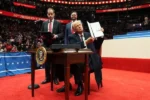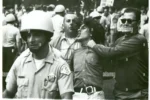Imagine being a superhero in your community, helping people every day, but facing a big challenge because of a mistake you made in the past. This is the story of Melynda Vincent, a social worker and single mother who turned her life around after struggling with addiction and homelessness. Despite her incredible journey of recovery and helping others, a federal court recently decided she can’t own a gun because of a felony conviction from 2008. Let’s dive into the important details of her story and why this ruling matters for people like Melynda, who are trying to rebuild their lives.
| Category | Details |
|---|---|
| Name | Melynda Vincent |
| Profession | Social Worker |
| Legal Issue | Felony conviction for bank fraud |
| Conviction Year | 2008 |
| Conviction Details | Writing a fraudulent check for $498.12 |
| Legal Consequence | Cannot own a gun due to felony status |
| Current Status | Completed drug treatment, earned degrees, working as a social worker |
| Lawsuit Filed | 2020 regarding gun rights |
| Dismissal of Case | October 2021 |
| Recent Rulings | 10th Circuit upheld dismissal in September 2023 and June 2024 |
| Supreme Court Involvement | Vacated 10th Circuit findings, directed reassessment |
| Panel Judges | Robert Bacharach, Paul Joseph Kelly Jr., Joel Carson |
| Key Argument | Second Amendment protection for nonviolent offenders |
| Outcome of Argument | Did not succeed; felons cannot own firearms |
| Relevant Law | § 922(g)(1) prohibits felons from firearm possession |
| Court Precedent | 10th Circuit ruling from 2009 remains valid |
The Impact of Felony Convictions on Gun Rights
Felony convictions can have serious consequences, one of which is losing the right to own a gun. This rule is in place to help keep communities safe. In the case of Melynda Vincent, who was convicted in 2008 for fraud, her felony status means she cannot legally possess a firearm. Even though she has worked hard to turn her life around, the law does not allow exceptions for those who have made mistakes in the past.
Many people believe that individuals who have committed nonviolent crimes, like Melynda, should be given a chance to regain their rights. However, current laws do not differentiate between violent and nonviolent felonies. This means that even after completing rehabilitation and making positive changes in their lives, these individuals still face restrictions on their rights, including the right to bear arms.
The Legal Journey of Melynda Vincent
Melynda Vincent’s journey through the legal system is a complex one. After her initial case was dismissed in 2021, she continued to fight for her rights. In 2023, the 10th Circuit decided to uphold the dismissal, stating that federal laws regarding gun ownership by felons were clear and binding. Despite her arguments that her past should not define her future, the court ruled that the law applies to all felons.
The appeal process is important because it allows individuals to seek justice and challenge previous decisions. However, in Vincent’s case, the courts confirmed that her felony conviction from 2008 still impacts her rights today. This ongoing legal battle highlights the struggles many face when trying to reclaim their rights after serving their sentences and working to improve their lives.
Understanding the Second Amendment and Gun Ownership
The Second Amendment of the U.S. Constitution protects the right to keep and bear arms. However, there are exceptions to this right, especially for individuals with felony convictions. The courts have ruled consistently that those who have been convicted of felonies, regardless of the nature of their crime, cannot own guns. This ruling aims to balance individual rights with public safety concerns.
Recent Supreme Court decisions, such as the one in the Rahimi case, have clarified how lower courts should interpret the Second Amendment. These rulings reinforce the idea that restrictions on gun ownership for felons are lawful. As legal interpretations evolve, it’s important to understand how these decisions affect individuals like Melynda Vincent, who are trying to navigate their rights and responsibilities in society.
The Impact of Felony Convictions on Gun Ownership Rights
Felony convictions carry significant repercussions, particularly regarding gun ownership rights. In the United States, federal law prohibits individuals with felony convictions from possessing firearms. This restriction aims to enhance public safety but often draws criticism for being overly broad. For instance, people like Melynda Vincent, who have demonstrated rehabilitation and commitment to their community, find their rights curtailed despite their positive contributions.
The consequences of such laws extend beyond personal restrictions; they also spark debates on the effectiveness of gun control measures. Critics argue that blanket bans on firearm possession may not effectively address crime, especially for nonviolent offenders. As seen in Vincent’s case, the legal system’s inability to differentiate between various types of felonies raises questions about fairness and the potential for reform in gun legislation.
Rehabilitation and Its Role in Gun Rights Restoration
Rehabilitation plays a critical role in discussions surrounding the restoration of gun rights for individuals with felony convictions. Many argue that successful rehabilitation should allow former offenders to regain their rights, particularly if they have demonstrated a commitment to turning their lives around. Melynda Vincent’s journey from addiction to becoming a social worker highlights the potential for change in individuals who have faced legal consequences.
However, the legal framework governing firearm possession does not currently account for personal rehabilitation milestones. As the courts uphold existing laws without exception, individuals like Vincent may feel disenfranchised despite their efforts to contribute positively to society. This situation calls for a reevaluation of policies that could allow for the restoration of rights in a more nuanced manner, taking into account individual circumstances and rehabilitation outcomes.
Court Rulings and Their Implications for Future Cases
The recent court rulings surrounding Melynda Vincent’s case underscore the complexities of Second Amendment interpretations. The 10th Circuit’s decision, which ultimately upheld the prohibition of firearm possession for felons, reflects a stringent adherence to existing laws. The divergent opinions among circuit courts create a patchwork of legal interpretations that can lead to confusion and inconsistency in gun rights across the United States.
As the Supreme Court continues to refine its stance on Second Amendment issues, future cases may see shifts in how courts assess individual rights versus public safety concerns. Vincent’s case illustrates the ongoing struggle for individuals with felony backgrounds to navigate a legal system that often appears unforgiving. The implications of these rulings may influence not only gun rights but also broader discussions on criminal justice reform and individual freedoms.
The Broader Conversation on Gun Control and Public Safety
The intersection of gun control, public safety, and individual rights continues to provoke intense debate across the nation. Advocates for stricter gun laws often highlight the need for rigorous restrictions on firearm access for felons, citing public safety as a primary concern. Conversely, opponents argue for the rights of nonviolent offenders, emphasizing that rehabilitation and community contributions should be recognized and rewarded.
Melynda Vincent’s case serves as a catalyst for this broader conversation, illustrating the real-life implications of gun control laws on individuals striving for redemption. As society grapples with these issues, finding a balance between protecting community safety and acknowledging the potential for personal change remains a formidable challenge. The dialogue surrounding these topics is crucial for shaping future legislation that addresses the complexities of gun ownership rights.
Frequently Asked Questions
What happened to Melynda Vincent in 2008?
Melynda Vincent was convicted of **bank fraud** for writing a **bad check**. She was struggling with being **homeless** and had a **drug addiction** at that time.
Why can’t Melynda Vincent own a gun?
Due to her **felony conviction**, Melynda Vincent is not allowed to own a gun. Both **federal** and **state laws** say that people with felony convictions cannot have firearms.
What did Melynda Vincent do after her conviction?
After her conviction, Melynda completed a **drug treatment program**, earned a **college degree**, and started working as a **social worker**. She also founded a center for **substance abuse treatment**.
What does the Second Amendment protect?
The **Second Amendment** protects the right to **bear arms**, meaning people can own guns. However, it has exceptions for certain individuals, like those with felony convictions.
What was the Supreme Court’s role in Vincent’s case?
The **Supreme Court** reviewed Melynda Vincent’s case and asked the lower court to look at it again. They wanted to ensure the laws about gun ownership for felons were clear and fair.
What is the ‘felon in possession’ law?
The **’felon in possession’ law** is a federal rule that says anyone with a **felony conviction** cannot legally own a gun. This rule is meant to keep guns away from individuals who may pose safety risks.
What does it mean for a court to uphold a ruling?
When a court **upholds a ruling**, it means they agree with the previous decision. In Melynda’s case, the court agreed that her felony conviction kept her from owning a gun.
Summary
The content discusses the legal challenges faced by Melynda Vincent, a social worker and single mother, regarding her inability to own a firearm due to a felony conviction for bank fraud in 2008. Despite overcoming personal struggles and contributing to society, her appeal to regain gun rights was dismissed by the 10th Circuit and upheld after a Supreme Court ruling clarified interpretations of the Second Amendment. The court ruled that federal law prohibits all felons from firearm possession, regardless of the nature of their offense, emphasizing the legality of such restrictions and reaffirming existing precedents.







